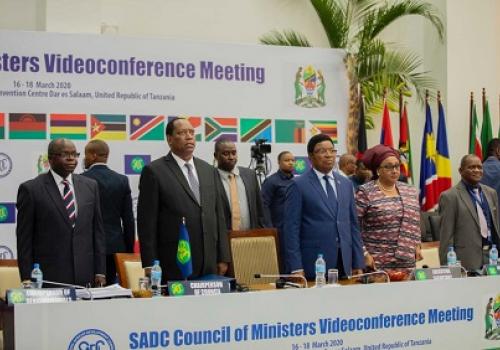The Council of Ministers of the Southern African Development Community (SADC) on 18th March, 2020 held a meeting via video conference to deliberate on the implementation of SADC regional integration programmes.
Speaking at the opening of the meeting, the Prime Minister of the United Republic of Tanzania, Right Honourable Professor Kassim Majaliwa Majaliwa applauded SADC for convening the meeting via video conference, adding that it is an indication of SADC’s capability to withstand any challenge that it faces.
Right Honourable Professor Majaliwa said, as SADC commemorates 40 years of existence this year, there is need to accelerate implementation of various programmes, through collective efforts in order to achieve the dreams and aspirations of the founders of the regional organisation.The Chairperson of SADC Council of Ministers and Minister of Foreign Affairs and East African Cooperation of the United Republic of Tanzania, Honourable Professor Palamagamba John Kabudi said the formulation of the SADC Vision 2050 and the Regional Indicative Strategic Development Plan (RISDP 2020-2030) will provide a new strategic direction to address contemporary regional challenges such as youth unemployment and gender inequality.
Hon. Prof Kabudi called on Member States to ensure that they involve all relevant stakeholders such as the academia, public and private sectors, research and education institutions and Civil Society in the finalisation of the SADC Vision 2050 and RISDP 2020-2030.
The Chairperson of Council expressed the commitment of the United Republic of Tanzania to the theme of the 39th SADC Summit, A Conducive Environment for Inclusive and Sustainable Development, Increased Intra-Regional Trade and Job Creation.
In her welcome remarks, the SADC Executive Secretary, Her Excellency Dr Stergomena Lawrence Tax said the holding of the Video Conference meeting for SADC Council of Ministers demonstrates SADC’s readiness to manage emergencies and disasters.
H.E. Dr Tax said the year 2020 is significant because SADC will be commemorating 40 years of existence. On this note, H.E. Dr Tax paid tribute to the founders of SADC for their foresight of a better region and urged Member States to explore ways of recognizing and celebrating 40th Anniversary of SADC.
During the meeting, the SADC Council of Ministers approved a total of US$94,913,815 towards the implementation of the 2020/21 Annual Corporate Plan for the SADC Secretariat, which will cover the priorities of the RISDP 2015-2020 namely; Industrial Development and Market Integration; Infrastructure, Peace and Security Cooperation, and Special Programmes of Regional Dimension.
Council directed the Technical Committee for Coordinating and Monitoring the Implementation of the SADC Protocol on Health to urgently convene and provide advice on a coordinated regional approach in dealing with the pandemic, taking into consideration national responses.
Council noted the progress in the formulation of the draft SADC Vision 2050 and the draft RISDP 2020-2030 which will form part of the broad SADC Post-2020 Agenda and urged Member States to ensure a participatory and inclusive approach, whereby consultations with all stakeholders are undertaken at national level to finalise these strategic documents.
Council approved activities for the commemoration of 40th Anniversary of SADC beginning 1st April 2020 with the aim of bringing to light the history of SADC and its key achievements since 1st April, 1980 when its forerunner, the Southern African Development Coordinating Conference (SADCC), was formed. The commemoration activities will, among others, include media campaigns and public statements by SADC Member States, highlighting the relevance, value and achievements of SADC.
Council noted that a total of 182 outputs were planned for implementation in line with the 2019/20 Operational Plan for the period April to December 2019 and that, as at December 2019, 153 outputs were successfully implemented, translating into 84% implementation rate by the Secretariat, which is an increase from 79 per cent in the 2018/2019 financial year.
The Council of Ministers is one of the institutions of SADC whose mandate, among others, is to oversee the functioning and development of SADC, and ensure that policies and decisions are implemented. The Council consists of Ministers from each of the 16 Member States; usually from the Ministries responsible for Foreign Affairs and International Relations, Economic Planning or Finance, and meets twice a year in March and August.
| Attachment | Size |
|---|---|
| Executive_Secretary_remarks_at_the_Council_of_Ministers_Meeting_March_2020.pdf | 325.38 KB |

